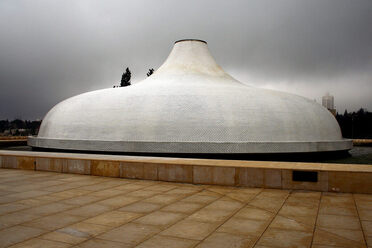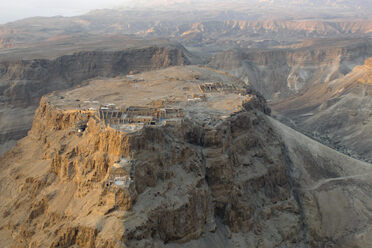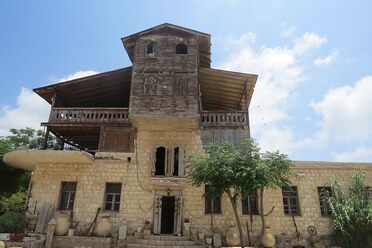| The mind doesn't care whether what you think is right or wrong, true or false, it simply accepts whatever you tell it. First you make your beliefs, then your beliefs create your reality, your truth. The world always matches your beliefs and your body acts in a way which manifests those beliefs.
Love Yehuda Lave |
|
|
| Watch: Torture Is the Norm in 'Palestine' More often than not, allegations of Israeli abuse take up all the headlines, leaving little room (or desire) to report on the verifiable abuses being perpetrated against the Palestinians by their own governments. This past Sunday, Hamas supporters across the Gaza and the West Bank were celebrating a 'day of rage' to mark the 31st anniversary of the founding of the terrorist group Hamas. The Palestinian Authority was driven out from Gaza in June 2007 and do anything in their power to crush anyone critical of the government in it's territories. In the video below we see PA security forces in Hebron crackdown on these "celebrations" , beating demonstrators with batons and throwing stun grenades. The video shows that the Palestinian Authority security forces used unrelenting violence against both male and female demonstrators in Hebron. The PA and Hamas do much more than beat dissedents with batons and throwing stun grenades. They regularly torture them. According to a scathing report produced by Human Rights Watch, those abuses are "systematic." The report labeled both the Palestinian Authority in the West Bank and the Hamas regime in Gaza as "police states," and wondered why Western governments that purport to oppose such things continue to send so much of their taxpayers' money to the Palestinians. Among the abuses Human Rights Watch uncovered after interviewing 147 Palestinians were "systematic arbitrary arrests and torture" which "violate major human rights treaties to which Palestine recently acceded" and "may amount to a crime against humanity prosecutable at the International Criminal Court." Individual Palestinians cited in the report spoke of horrific mistreatment at the hands of their own police and security forces. A journalist arrested in the West Bank for criticizing the Palestinian Authority of Mahmoud Abbas said that police officers tied his hands to the ceiling and "slowly pulled the rope to apply pressure to his arms, which caused him to feel so much pain that he had to ask an officer to pull his pants up after he used the toilet because he could not do it himself." A civil servant in Gaza who was arrested for daring to criticize Hamas on Facebook was subjected to "positional abuse… causing him to feel 'severe pain in my kidneys and spine' and as if his neck would 'break' and his 'body is tearing up inside." The report spent a great deal of time addressing the use of "positional abuse," whereby both PA and Hamas authorities force detainees into positions that cause excruciating pain, but leave little or no marks of physical harm.
Here is the You tube link:
https://www.youtube.com/watch?time_continue=4&v=SzwyIO98WEY |
|
|
147-photography-techniques |
|
|
RABBI ELI MANSOUR Visit DailyHalacha,com, DailyGemara.com, MishnaBerura.com, LearnTorah.com In Parashat VaYechi, in Perek 50, Pasuk 16, the Torah writes that Yoseph's brothers came to him after their father's death and said to Yoseph that their father Yaakov gave to them orders prior to his passing. The orders given to the brothers by Yaakov, was to go on to Yoseph and ask forgiveness for all the spiteful deeds committed. Rashi comments on this Pasuk and says that the brothers actually fabricated this request from Yaakov. Yaakov Aveenu never explicitly instructed the brothers to go to Yoseph and ask him for forgiveness. So this was a lie. Rashi asks how can it be that the brothers came and lied to Yoseph? Rashi answered that the brothers did this for the sake of peace. From here we learn a great lesson. It is so important to keep peace that it would even be permissible to fabricate or extend the truth a little if necessary. The Ba'ale Tosafot (a group of Torah Scholars, mainly grandsons and great grandsons of Rashi) learn from this that peace is so important, that the Jewish people must even engage in conciliatory discussions before heading into war. That includes our arch enemies. We must expend all efforts to attain peace before going to war. The Torah tells us earlier in Parashat VaYera that Sarah had laughed when she heard that she was going to have a baby. She disparaged her husband remarking how can he have a baby at his age?? But when G-d spoke to Avraham, G-d told him that Sarah felt she was too old to have a baby. So you see, G-d himself changed what was said in order to keep peace between Avraham and Sarah. This is the same motivation and purpose as used in Parashat VaYechi. From these two examples in the Torah we see how a fabrication was made in order to achieve peace. Now if the Torah writes it then it means fabrication is an acceptable behavior in cases where it is done in pursuit of peace. The Torah brings this story down of the brothers not to show us that they made a mistake, but to teach us that peace sometimes supersedes truth. Furthermore, since this theme was repeated in the Torah, we therefore must acknowledge its great importance and clear message. One must go out of his way to achieve peace at all costs. That includes peace between man and wife, man and family, man and his siblings, man and his fellow friends, etc. The Torah is teaching us that Shalom is so important that it even overrides one of the most important values of being Emet (truthful). It seems that true Emet manifests itself as a result to peace. Meaning, that it is a proper behavior to lie if needed to achieve pace, for that lie ultimately will lead to Shalom. |
|
|
AS HEARD FROM RABBI AVIGDOR MILLER Z'TL "And he (Yaacob Avinu) kissed them (Efraim & Menashe) and he embraced them ". (48:10) The love of one's children is expressed by the love of the children's children. Especially when the children's children are young, the parent experiences a repetition of the love that he had felt for his own children when they were younger. The love that Yaacob had always had toward Yosef, and the love for Yosef's mother Rachel who had died prematurely, was expressed in the love for Yosef's sons. We see from the conduct of this family that they expressed their affection by kissing and embracing, just as did Esav and Yaacob (33:4) and as did Yosef and his brothers (45:14-15). Instead of being cold philosophers ("Stoics") that are ashamed of emotions, our Fathers expressed their love by acts of demonstrative affection, and they thus served Hashem by encouraging the feelings of kindliness and love which cause Perfection of the soul. We see that this family expressed their love of kin in a highly emotional manner and we learn therefrom that it is an excellence of the soul to love one's kin with powerful emotion. By loving one's kin, one comes to love one's kin's kin and eventually he attains the feeling that the entire house of Israel are his kin. The perfection of character toward one person tends to spread and is subsequently broadened to include others. The Rav's advice regarding raising children included that we should always talk to our children. By talking to them with a voice full of emotion and love we make a very strong impression which will eventually bear fruits. Tell them that Hashem loves, cares for and is protecting them. Tell them how much their mother and father love, care for and are proud of them. But always remember to caress your child's very tender cheek while you are saying these loving and encouraging words to them. This is the Key we learn from our great Family. Adapted from "The Beginning" by Rabbi Avigdor Miller ZT'L
|
|
|
Impurity, Treife, and the Monsey Butcher Scandal Posted: 17 Dec 2018 10:04 AM PST One of the differences between rationalists and mystics is their different views regarding metaphysical entities. Rationalists minimize the number of supernatural entities and forces; mystics, on the other hand, tend to maximize the number of supernatural entities and forces.
In the mystical worldview, metaphysical entities are not restricted to the world of angels and demons. Rather, there are metaphysical forces which lie at the core of basic principles of Judaism. Rationalists, on the other hand, understand these principles to be independent of a metaphysical framework, the existence of which they do not accept.
 The concept of tumah, usually translated as "impurity," lies at the heart of many commandments. Corpses and dead vermin transmit impurity. The emission of certain bodily fluids renders one in a state of impurity, as does childbirth. Animals that are forbidden from consumption are also described as "impure" (the colloquial term " treife" is inaccurate). The concept of tumah, usually translated as "impurity," lies at the heart of many commandments. Corpses and dead vermin transmit impurity. The emission of certain bodily fluids renders one in a state of impurity, as does childbirth. Animals that are forbidden from consumption are also described as "impure" (the colloquial term " treife" is inaccurate).
But what is this "impurity"? According the mystical approach, this impurity is a metaphysical state—a sort of invisible, spiritual "dirt." It has objective existence, regardless of how people relate to it. According to the rationalist approach, on the other hand, impurity is not a metaphysical state. Rather, it is a designation, a state which we (following God's instructions) ascribe to certain people, creatures and objects.[1] And we are forbidden to eat certain foods, in order to accomplish various functions relating to perfecting our characters and our society; there is nothing inherently metaphysically impure about these foods.
The differing views on the nature of impurity are also seen in the laws of accidental and forced transgression.[2] The Torah is explicit that if someone sins by accident, they must nevertheless bring an offering. But why? Ramban, following the mystical approach, explains that even though it was an accident, the impurity has nevertheless tainted one's soul.[3] Rambam, on the other hand, explains that he has to atone for being somewhat negligent, as had he been more careful, the accident would not have happened.[4]
What if someone ate impure food through absolutely no negligence on their behalf, or in a case where it was halachically required (such as for survival)? According to Rambam, there are no negative consequences whatsoever.[5] Indeed, in a situation where kosher food items are mixed up with a non-kosher food item, according to many views one is entitled to rely on the majority of items and eat all the food, because with any given item, the odds are that it is kosher. This is despite the fact that if one eats all the items, one has certainly consumed the non-kosher item! Evidently, there is no concern for metaphysical harm; the only problem of eating non-kosher food is transgressing institutional prohibition.
According to the mystical approach, on the other hand, even if one eats non-kosher food in a situation where it is halachically permissible, or where there was no negligence at all, it has nevertheless still harmed one's soul. This was seen in the discussion following the notorious scandal in Monsey, where a respected butcher was discovered to have been selling non-kosher meat for years. Responsa published after the event made no reference to Rambam's view (they were probably unaware of it) and quoted numerous opinions from the mystically-inclined Rishonim to demonstrate that even though it was a case of onnes (no negligence at all), there would still be metaphysical harm caused to peoples' souls.[6] (The few opinions quoted in opposition stated that the metaphysical harmful characteristics of non-kosher food only come into existence where eating them is a sin, not in a case of onnes, but this is far from straightforward. The Rishonim who advocate for non-kosher food possessing metaphysically harmful qualities certainly appear to see this as a property of the food itself, which is the very cause of it being halachically forbidden, rather than being generated as a consequence of the prohibition.)
The differing views of the nature of non-kosher food may also explain the differing approaches with regard to checking vegetables for insects. Those who advocate for a far more intensive search than was traditionally done are usually of the mystical mindset, and are concerned for actual metaphysical harm that will be sustained by eating insects. Those following a rationalist approach, on the other hand, are of the view that following the classical halachic requirements is all that is required, and there is no metaphysical harm about which to be concerned.
______________________________ __ [1] See Mishneh Torah, Hilchos Mikvaos 11:12. For extensive discussion, see Menachem Kellner, Maimonides' Confrontation with Mysticism, chapter 4. [2] See Kellner, Maimonides' Confrontation with Mysticism, chapter 2. [3] Ramban, Commentary to Leviticus 4:2. [4] Rambam, Guide for the Perplexed 3:41. [5] Guide 3:41; Mishneh Torah, Hilchos Maachalos Issuros 14:10-13. In fact it would seem that Rambam would define the category of onnes as a case where there was no negligence, whereas others would have a more limited definition. [6] See Rabbi Gedaliah Oberlander, "Timtum Halev MeiAchilas Ma'achalos Issuros B'Onnes," Ohr Yisrael 45 pp. 103-109, and the rejoinder by Rabbi Yaakov Dovid Luban, Ohr Yisrael 46, pp. 49-52, available online here. |
|
|
The Atlas Obscura Guide To Israel 51 Cool, Hidden, and Unusual Things to Do in Israel Unusual Attractions in Israel  Ashkelon, Israel Beit Guvrin Caves These numerous Israeli caves were dug out over hundreds years for reasons ranging from hideouts to burial sites.  Acre, Israel Rosh HaNikra Grottoes The bluer than blue waters in these natural Israeli caves are reached via the world's steepest cable car.  Jerusalem, Israel Razzouk Ink This family tattoo parlor has been inking religious pilgrims in the Middle East for 700 years.  Jerusalem, Israel Shrine of the Book The home of the Dead Sea Scrolls is an abstract modernist dream.  Masada, Israel Masada This daunting 1st century fortress was purportedly the site of one of the most dramatic revolts of the Jewish-Roman wars.  Haifa, Israel Atlit Yam Submerged ruins of a Neolithic coastal settlement, where houses, wells, graves and skeletons have been unearthed.  Nahariya, Israel Akhzivland The most peaceful "country" in the Middle East.  Ramat Negev Regional Council, Israel Makhtesh Ramon A massive, heart-shaped, wind-carved crater in the middle of the Israeli desert.
Unique Food & Drink in Israel  Amba The spicy, sour mango sauce is beloved from India to Israel.  Gazoz A bit of the past bubbles up in Israel's reinvention of its classic summer sipper.  St. Peter's Fish It's what you order when you're a Christian pilgrim at the Sea of Galilee.  |
|
|
See you tomorrow
Love Yehuda Lave
|
|
|
| | | |
 | | | | | |
|  |
|
| |
|